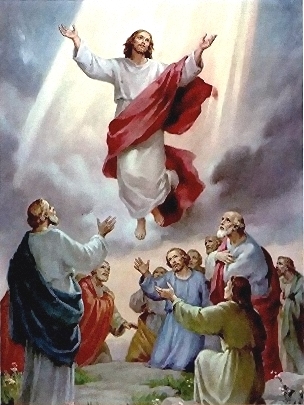Pentecost, the end of the Easter season, is only a week away, and today’s readings remind us that, like the first apostles and disciples, we must let ourselves be shaped by the Word and his Spirit. That may involve taking a new direction in life, drawing closer to the fount of grace in order to achieve a glorious life through giving witness, even unto death, of the glories Our Lord has worked in us and will work through us.
In today’s First Reading St. Stephen, the first martyr, is speaking in a language that his persecutors understand. It is a message that comes with the power of the Holy Spirit, who’s coming on Pentecost to energize the budding Church for her mission that we’ll celebrate in a special way next week. He bears Our Lord’s own words: “Son of Man standing at the right hand of God.” Those words brought death to Jesus as well, because they were a testimony that Our Lord was the Messiah. Stephen’s testimony went to martyrdom, and that martyrdom bore fruit: Saul became the great apostle St. Paul.
In today’s Second Reading St. John reminds us that Jesus’ Word is above all an invitation to enjoy eternal life. The Spirit and the bride say, “Come.”—the Church, that bride described by St. John—in the power of the Holy Spirit extends that invitation that Christ may come into her life and the life of all believers. Let the hearer say, “Come.”—he wants that invitation to be repeated on our lips as well. He wants Christ to come into our lives, and to come into the lives of those to whom we give witness. That invitation is to satisfy a deep need in man that mankind can satisfy in no other way: “Let the one who thirsts come forward, and the one who wants it receive the gift of life-giving water.” That life-giving water is grace, the love and life of God, which unites us to God and to each other and lets the glory of God shine within us.
In today’s Gospel Our Lord prays for those who will believe in him through the words of his disciples. Like St. Stephen, we must bear the word of Jesus so that others can believe. It means giving witness, it means taking the blows of ridicule, misunderstanding, contempt. We may not suffer a physical martyrdom, but there may be a character assassination, ridicule, and scorn. Through Jesus’ word, he prays that we will be united as he is united to his heavenly Father. Through Jesus’ word, he prays that we will share the same glory that his heavenly Father has given him, and through that unity and glory he prays that the world will know that he was sent by his heavenly Father and that the heavenly Father loves them as much as he loves Jesus.
Irenaeus described the glory of God as being man truly living his life: Gloria Dei vivens homo. Man glorifies God by living his life in truth and love to the maximum degree, bolstered by the grace and love of God. Not just passing things, so many toys that are new, then boring, then discarded—money, career, pleasure, power. Not just surviving in an evil and troubled world. Living the Gospel in all its fullness. Eternal life started in our hearts the day of our baptism and wants to grow, to take hold of us and transform us. That growth is made possible by Christ in the power of his Spirit. His word must become our word. His Spirit must become our Spirit, and through faith and prayer and sacrifice we make his words our own, and his Spirit will fill us and transform us.
Readings: Acts 7:55–60; Psalm 97:1–2, 6–7, 9; Revelation 22:12–14, 16–17, 20; John 17:20–26. See also 7th Sunday of Easter, Cycle C, 7th Week of Easter, Thursday, St. Stephen, First Martyr, and 3rd Week of Easter, Tuesday (2).


